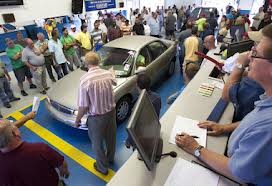When you are getting ready to buy a new pickup truck, one of the first things that you will need to decide is whether you want a gas or diesel engine. While there are staunch supporters on both sides, it may be surprising to discover how close the debate really is. In a head-to-head competition, both options prove to be superior in one way or another. The key is deciding which factors are most important to you and then make your decision from there. Here is a close look at an issue which likely will not be resolved soon – gas vs. diesel pickup trucks – which is a better buy.
7 Key Factors in the Gas vs. Diesel Pickup Truck Debate
The Initial Investment
If one of your main priorities is saving money on your initial purchase, then gas powered trucks are probably where you will end turning. It has been reported that in Class 3-4 trucks, gas engines will normally be around $5000 to $8000 less expensive. This gap has continued to increase over the past decade as diesel trucks have had to develop advanced technologies to comply with new emissions regulations set force by the EPA. More stringent regulations took effect in 3 year increments starting in 2004, with the most recent being in 2010. Until there is a more cost efficient method to develop and implement exhaust after-treatment technologies, there is a good chance that this gap to continue to increase. At the same time, once these technologies have matured and become more cost-effective, this gap could start to diminish.
Overall Fuel Efficiency
The Department of Energy states that a diesel engine will offer a better overall fuel efficiency of about 30% to 35%. This is primarily due to the combustion process differences between the two. A diesel engine utilizes a combustion process, whereas a gasoline engine uses a conventional spark ignition. Additionally, diesel fuel contains a higher energy density. As a result, a smaller amount of fuel is needed to create the same level of power as gasoline.
Fuel at the Pump – Price and Availability
Since 2000, diesel and been an average of 14 cents more per gallon than gasoline. The largest difference was just over 75 cents more. The reasons for this stem primarily from higher taxes and environmental restrictions. Another thing to keep in mind is that it can be more difficult to purchase diesel as well because some gas stations don’t have diesel pumps. In fact, there are several states that it is nearly impossible to get diesel fuel for a pickup truck – it is only readily available for heavy machinery
Resale/Trade-In Value
The resale and trade-in value of diesel pickup trucks are consistently higher than gasoline pickup trucks. There is a variety of reasons for this. The primary reason is the diesel engines have a much longer lifespan. This is because they have higher compression ratios and high cylinder pressure. As a result, the parts are built to be much stronger – especially the block and cylinder heads, crankshaft, pistons, and valves. This is essential to cope with higher engine temperatures. On a side note, the exhaust system that accompany diesel engines tend to last longer as well. Another reason that they last longer is because they have a better operating efficiency. This is due to their emphasis on providing more torque at a lower speed, resulting in a much lower rpm than gasoline engines. Additionally, because of the higher initial cost of a new diesel engine, the secondary market tends to have a much greater demand for them.
Maintenance Costs
Over the lifetime of a pickup truck, a gas engine tends to cost less. This is because the diesel engine has parts and components that are not found in a gas engine and can require servicing more often. For example, the oil reservoir in a diesel engine is larger, which makes it more expensive to maintain because it is more expensive to refill. Additionally, the water separator and fuel filter will often need to be replaced more often. Gasoline engines also have longer service intervals for key parts such as oil, coolant, and spark plugs.
Power and Towing Ability
There is little question that diesel engines are much more ideal to provide more power and better towing/hauling capabilities. The high compression ratio required for a diesel engine to operate allows it to generate more torque and power at a much lower rpm. Using a gasoline pickup truck for heavy towing on a regular basis will result in a much shorter engine life and much higher gas consumption. With this in mind, the most important thing to consider is how much power you really need. A lot of people think that they diesel engine, however rarely actually use the additional torque that one provides. It all comes down to choosing the right tool for the job, rather than solely focusing on power and torque.
Environmental Effects
If there is one issue that likely won’t be resolved soon, it is which engine is better for the environment. The average person will likely say that diesel engines are much worse for the environment. This is because they have a historically had issues meeting emission standards for the release of particulates and nitrogen oxide. At the same time, gasoline engines release more carbon dioxide. Additionally, since diesel engines use less fuel over the longer trip, they could prove more environmentally friendly. A critical element to this debate is how old the truck is. If you look new trucks, diesel and gas, they have become very similar in terms of emissions. This is largely due to the 2010 EPA emission standards. In the end, while diesel may still have slightly higher emissions, the greater fuel efficiency could be an equalizer since a gallon of diesel will last longer than unleaded gas.

Gas Vs. Diesel Pickup Trucks – Who Wins?
In the end, it is clear why this debate may not end anytime soon. While gas pickup trucks are less expensive to purchase and maintain, they have a lower resale value. Diesel pickup trucks are more expensive to fill at the pump, but offer greater fuel efficiency and more torque. Environmentally, they have become fairly similar. As a result, there is no clear winner – it all comes back to choosing the right truck that will meet your needs.











